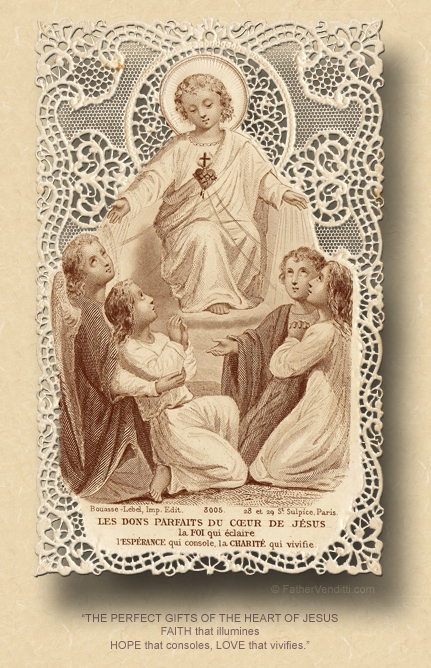Why Does Our Lord Keep Testing the Faith of the Faithful?
The First Friday of Advent.
Lessons from the feria, according to the ordinary form of the Roman Rite:
• Isaiah 29: 17-24.
• Psalm 27: 1, 4, 13-14.
• Matthew 9: 27-31.
The Third Class Feast of Saint Bibiana, Virgin & Martyr; and, the Commemoration of the First Friday of Advent.*
Lessons from the common "Me expectavérunt…" of Virgins for a Virgin Martyr, according to the extraordinary form of the Roman Rite:
• Ecclesiasticus 51: 13-17.
• Psalm 45: 6, 5.
• Matthew 13: 44-52.
The Twenty-Eighth Friday after Pentecost, the Third of Philip's Fast; the Feast of the Holy Prophet Habakkuk; and, the Remembrance of the Passing of the Blessed Confessor Ivan Slezyuk, Bishop of Ivano-Frankivsk.**
Lessons from the pentecostarion, according to the Ruthenian recension of the Byzantine Rite:
• Hebrews 7: 18-25.
• Luke 20: 19-26.
FatherVenditti.com
|
 8:17 AM 12/2/2016 — It is the First Friday of the month, and, as is our custom here at the Shrine, we will expose the Blessed Sacrament after Holy Communion today, and pray together a Litany. Since this is our first First Friday since the close of the Holy Year, I’ve decided to pay tribute to that year-long event which was so meaningful to us by using today the Litany of Mercy. The rest of the time will be yours to speak with our Blessed Lord, during which I’ll be available for more confessions, and we will conclude with Benediction at one-thirty. 8:17 AM 12/2/2016 — It is the First Friday of the month, and, as is our custom here at the Shrine, we will expose the Blessed Sacrament after Holy Communion today, and pray together a Litany. Since this is our first First Friday since the close of the Holy Year, I’ve decided to pay tribute to that year-long event which was so meaningful to us by using today the Litany of Mercy. The rest of the time will be yours to speak with our Blessed Lord, during which I’ll be available for more confessions, and we will conclude with Benediction at one-thirty.
Today's Gospel lesson is simplicity itself, and doesn't require much of a homily, except to say this: before curing the two blind men who are pursuing Him, our Lord asks them a question: “Do you believe that I can do this?” (Matt. 9: 28 NABRE). It seems odd—doesn't it?— that He should ask this. After all, why would they ask Him if they didn't already believe He could do it? But, remember, our Lord rarely performs a cure without some sort of lesson to go along with it; and, in this case, the lesson is about faith. Clearly, they had it, otherwise they wouldn't have approached Him; but, He forced them to bear witness to it. He made them speak it out loud to illustrate to them—and to us—that the gift of faith is not something private for ourselves alone, but must proclaimed.
Our faith is not something that has been given to us for our own personal consolation; it is a call to action, a call to evangelization. The faith we posses defies the laws of physics: it increases in us the more we give it away to others.
At the end of the lesson, our Lord commands them to say nothing to anyone about what He's done, and we've spoken about this “messianic secret” before which often follows our Lord's cures; but, I tend to think that, in this case, our Lord is imposing this requirement on them tongue-in-cheek. After all, He's just forced them to make a public Act of Faith as a prerequisite for the cure; I can't imagine He's now asking them to take it back. I think what He's doing is just throwing them an additional challenge to test them, to see whether the gift of healing He's given them has healed them in spirit as well as in body. And it did, because, as the Gospel says, “…they went out and spread the word of him through all that land” (v. 31 NABRE). Mission accomplished. Not only did they receive the greatest of gifts from our Blessed Lord, but they spread what they had received to others.
May we never shy away from telling everyone we meet about the great gift of faith that we have received.

* In the extraordinary form during Advent, whenever a feast is observed, the feria is commemorated, but a Mass is not permitted for this commemoration; rather, the commemoration is made at Mass by an additional Collect, Secret and Postcommunion added to those of the feast. The commemoration is made at Lauds and Vespers by adding an additional antiphon, verse and Collect to those of the feast.
St. Bibiana was martyred under Julian the Apostate in the year 363.
** Cf. the first paragraph of the first footnote attached to the post here for an explanation of Philip's Fast. Today is the third Friday of Philip's Fast because the season began on a Tuesday.
Habakkuk (or Habacuc) lived toward the end of the 7th century BC. He foretold the ruin of the Temple and the destruction of Jerusalem and, like Nahum, the punishment of Niniveh.
Blessed Ivan Slezyuk was born on January 14, 1896, at the village of Zhyvachiv, in the Ukrainian region of Stanislaviv, now called Ivano-Frankivsk. Ordained in 1923, he became Coadjutor of Stanislaviv, and was arrested by the Bolsheviks at exactly the time that his predecessor, Bishop Khomysyn, died in a prison in Kiev. Himself imprisoned and released several times, he died on this day in Stanislaviv in 1973, and was beatified by Pope Saint John Paul II on June 27th, 2001, together with 24 other Ukrainian victims of the Soviet regime.
|

